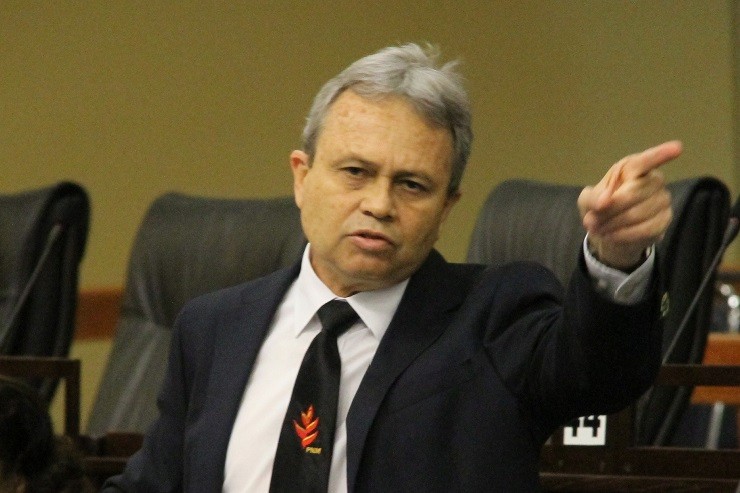(Trinidad Guardian) Citizens are now paying more to travel after a 15 per cent increase in the price per litre of super gasoline and diesel went into immediate effect yesterday. Alcohol and cigarettes are also going up, a 50 per cent tax will be levied on luxury vehicles with an engine size exceeding 1999cc, and Internet shoppers will face a seven per cent tax by September.
These were some of the key measures Finance Minister Colm Imbert presented in the government’s first Finance Variation of Appropriation Bill 2016 in the House of Representatives, yesterday.
Imbert said the Government, in the future, intends to “introduce a new regime for fuel so that the price will go up and down based on the international prices of oil and petroleum products.
“Like (former businessman) Max Senhouse used to say, ‘we need the money,’” Imbert told legislators in his 88-minute presentation, adding that citizens cannot have “champagne taste with mauby pockets.”
“The price of super gasoline would be increased by 15 per cent to (retail at) $3.50 per litre. The price of diesel will be similarly increased by 15 per cent to $2.00 per litre,” he said of the fuel hike.
According to Imbert, “super gasoline will no longer be subsidised at the current oil price,” while diesel will remain subsided “at this time by approximately $1 per litre.” Premium gasoline is already not being subsidised, he noted.
He said the fuel subsidy had cost the country $31 billion in the past ten years, adding that studies show the subsidies “disproportionately benefit the rich rather than the poor.”
Imbert said the fuel subsidy was contributing to “traffic congestion, pollution, damage to roads, environmental damage and revenue leakage,” adding that even after the adjustment in domestic fuel prices in November 2015, “the current cost of the fuel subsidy, including arrears, remains at close to $600 million at current oil prices.”
Imbert said to cushion the effects of the price increase in diesel, there will be a reduction in taxes on maxi taxis and taxis. He told legislators the measure was intended to reduce the cost of public transport vehicles, and the tax reductions are to be implemented next month after the Finance Bill 2 is approved in Parliament. That bill is to be debated in Parliament next month.
On the other hand, Imbert said Government will remove all taxes on CNG, electric and hybrid cars with engine sizes up to 1999cc and will begin the process for conversion of all government vehicles, fast ferries and water taxis to CNG and or alternative power sources.
He said the mass transit system that was promised by the People’s National Movement during last September’s election campaign was determined to be “expensive and not feasible at this time” by the International Development Bank.
“We simply cannot afford to proceed with this project at this time,” he added.
The measure was intended to be the solution to the country’s traffic woes.
Imbert was also unable to say exactly when and how public officers will be paid the second half of their backpay and arrears, which were awarded before the September 2015 general elections under the then PP government.
He said the Government intends to pay 50 per cent of the outstanding arrears of salaries to public officers by the end of June 2016, and hopes to pay the remaining 50 per cent in either interest-bearing government bonds by the end of September 2016, or in further instalments in cash in 2017, at the option of the workers.
Addressing the foreign exchange issue, Imbert said the dramatic fall in the country’s energy receipts had created a severe imbalance in the supply and demand for foreign exchange. He added, however, that the country’s foreign reserves have remained stable.
He said the foreign exchange issue was affected by other factors, including the sharp increase in bank credit, particularly for automobiles and undoubtedly some capital flight, which added to the pressures in the foreign exchange market.
He said the Central Bank had allowed the exchange rate to adjust, but the country still has 11 months of import cover.
“We do not intend to allow our currency to become unstable and the Government will intervene as and when necessary to defend and stabilise our exchange rate,” he insisted.
According to the minister, “Appropriate measures will be taken to ensure that our exchange rate does not move by more than a further 3.3 per cent from today’s rate.”
Imbert said the country must put its financial house in order by 2018 when the gap between current revenue and total expenditure, including capital expenditure, must not exceed $10 billion.

The debate was not without controversy, as the Opposition tried unsuccessfully to have the debate delayed on the grounds that it did not have the required time to prepare its response.
But House Speaker Bridgid Anisette-George got the majority vote required to have the matter proceed. Opposition Leader Kamla Persad-Bissessar, who was the first to respond, was given 88 minutes like Imbert.
More info
Other measures to be introduced include the following:
- A levy of seven per cent to be imposed on purchases of goods and services through the Internet from retail companies resident overseas, that are not subject to taxation in T&T.
He said that move will affect companies such as Dell, Walmart, Staples and Amazon.
“This tax is intended to help manage the increase in foreign outflows from online purchases, reduce revenue leakage and assist local manufacturers and service companies to compete with overseas retailers.” It will take effect from September.
- Increase of 50 per cent customs duty and motor vehicle tax on luxury vehicles, starting with private motor vehicles with engine size exceeding 1999cc, which will take effect immediately.
- Better collection of taxes from the gaming and gambling industry
- Increased taxes on alcohol and tobacco products, to take effect next month.





